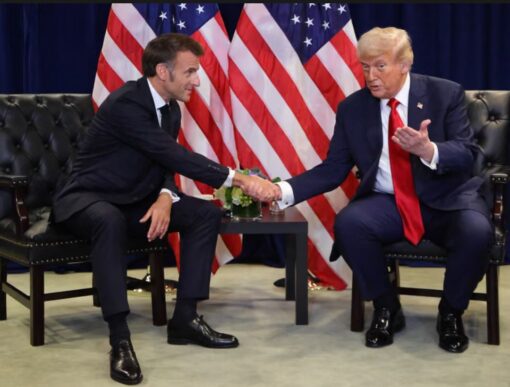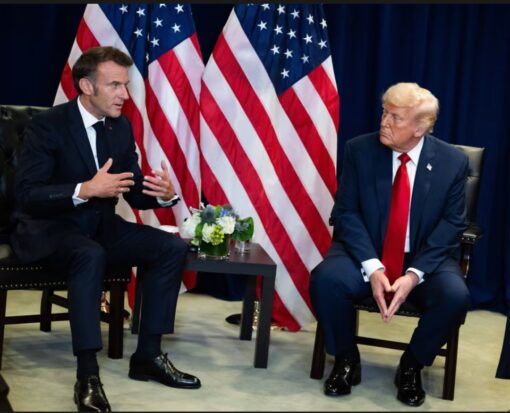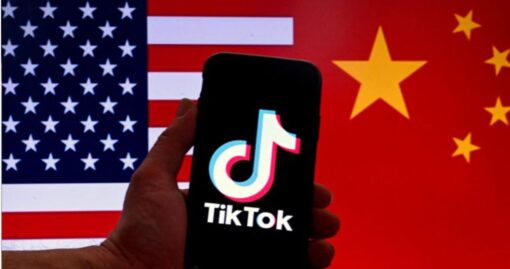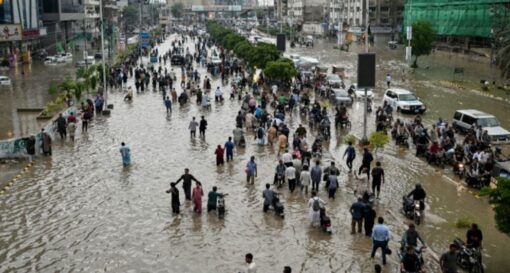French President Emmanuel Macron has warned that any Israeli attempt to annex parts of the occupied West Bank would constitute a “red line” for both the United States and Europe, declaring that such a move would also mark the collapse of the Abraham Accords, the normalization agreements between Israel and several Arab states.
Speaking after a high-level meeting with U.S. President Donald Trump on the sidelines of the UN General Assembly, Macron revealed that he had received assurances from Trump that Washington shares this stance and would act decisively if Israel pursued annexation.
The remarks underscore mounting tensions surrounding Israel’s settlement expansion plans, particularly in the sensitive E1 corridor east of Jerusalem, and highlight growing international pressure for a renewed push toward a two-state solution.
Macron’s Warning at the UN
In an interview with France 24, Macron stressed that Europe, the United States, and Arab partners needed to be aligned in their response to Israel’s actions. He confirmed that during his private talks with Trump, the U.S. president had made clear that annexation of West Bank territory would be unacceptable.
“On that topic, in very clear terms, the Europeans and the Americans are on the same page,” Macron said. “Annexation would be the end of the Abraham Accords. The United Arab Emirates were very clear on this. I think it is a red line for the USA.”

The French president said he had handed Trump a detailed three-page plan on the future of Palestine. The proposal builds on the New York Declaration, endorsed by more than 140 countries earlier this month, which envisions a post-war governance structure in Gaza and the West Bank that excludes Hamas.
Macron emphasized that his immediate priority was to achieve a ceasefire and the release of hostages, but he insisted that a broader political framework was essential to prevent escalation. “We have to convince the Americans to put pressure on Israel,” Macron said, calling the U.S. “the country with real leverage.”
The Abraham Accords at stake
One of Trump’s most celebrated achievements from his first term was the signing of the Abraham Accords in 2020, which normalized relations between Israel and Arab states including the United Arab Emirates and Bahrain. For Trump, the agreements were a hallmark of his foreign policy success in the Middle East.
Macron’s remarks that annexation would unravel these accords strike at the heart of that legacy. Regional actors have already warned that Israeli moves to claim sovereignty over parts of the West Bank would upend fragile diplomatic progress. “If Israel goes forward, the accords are finished,” one senior Emirati diplomat told reporters in New York.
For Israeli Prime Minister Benjamin Netanyahu, this warning creates a dilemma. His governing coalition, dominated by far-right parties, has repeatedly called for annexation either partially or completely. Yielding to those demands risks alienating Israel’s closest partners, while rejecting them could fracture his coalition.
Trump balancing diplomacy and domestic politics
According to Steve Witkoff, Trump’s special envoy, the U.S. president presented regional leaders with a 21-point peace plan earlier this week, which he described as “a framework for stability.” Witkoff said: “We’re hopeful – and I might say even confident – that in the coming days we’ll be able to announce some sort of breakthrough.”
Behind closed doors, Trump has reportedly emphasized to Netanyahu that unilateral annexation would jeopardize Washington’s broader Middle East strategy.
However, British officials have voiced concerns that Trump may still recognize Israeli sovereignty over West Bank settlements in retaliation for several Western allies — including the UK, France, Canada, and Australia — officially recognizing Palestine as a state this month.
Such a move, diplomats warn, would be a “serious blow” to any prospects of a two-state solution, effectively cementing division rather than encouraging negotiation.
France’s push for a political settlement
Macron’s broader vision focuses on isolating Hamas while providing Palestinians with a viable political future. The French president has argued that without a credible political horizon, despair and violence will escalate.
“If you don’t give a group of people a political way out for their legitimate existence, when the international community recognized that 78 years ago, you are going to lead them to a complete loss of hope — or even worse violence,” he said.
Macron called Netanyahu’s “total war” approach a strategic failure. “There are just as many Hamas fighters as before. Total war from a practical point of view is not working. This war is a failure,” he said. He also condemned Israel’s strikes on negotiators in Qatar, saying such actions undermined efforts to secure hostage releases and ceasefire talks.
He argued that Netanyahu’s government was prioritizing military escalation over the safe return of hostages. “The fate of hostages and Gaza’s civilian population should not be left in the hands of those for whom their release is not a priority,” Macron declared.
Europe Divided but Shifting
While France has pushed for recognition of Palestinian statehood as a means to relaunch peace talks, not all European partners share Macron’s urgency.
Germany and Italy, citing historical sensitivities, have resisted calls for sanctions on Israel. Macron admitted these divisions but said he was working to change the calculus. “Each country has its own history and sensitivity,” he said.
Still, recognition of Palestine by the UK, Canada, Australia, and several others signals momentum for a shift in Western policy. Macron hopes France’s advocacy will keep the EU engaged in pressing for a negotiated settlement rather than leaving the initiative solely to Washington.
Netanyahu Faces Growing Pressure
As Netanyahu prepares to address the UN General Assembly later this week, he faces mounting international criticism. If annexation moves forward, he risks alienating Israel’s allies and destabilizing relations with Arab neighbors. If he halts the push, his fragile coalition could collapse under pressure from right-wing partners.
“Netanyahu is in a bind,” one European diplomat commented. “He cannot satisfy his domestic hardliners and also preserve international legitimacy if annexation is pursued.”
For many analysts, Macron’s intervention signals Europe’s determination not to remain passive. “Macron is clearly trying to position France as a broker for peace,” said Dr. Leila Harran, a Middle East expert. “He is telling both Trump and Netanyahu that the international community will not tolerate annexation.”

What Comes Next
Trump and Netanyahu are scheduled to meet at the White House on Monday, a conversation expected to be dominated by annexation plans and the U.S. peace framework. The outcome could determine whether Macron’s warnings are heeded or whether Israel proceeds with its controversial settlement agenda.
Meanwhile, pressure is mounting at the UN. Over 140 states have already backed the New York Declaration, which envisions a future Palestinian authority free from Hamas. If annexation occurs, that fragile consensus could unravel, plunging the peace process into deeper uncertainty.
Would you like me to also prepare a shorter SEO headline (under 10 words) optimized around the West Bank keyphrase for stronger ranking?
For now, Macron’s message is unmistakable: annexation would not only cross Europe’s red line but also Washington’s, potentially dismantling the Abraham Accords and shattering hopes for regional stability.
The stakes surrounding Israel’s West Bank policies have rarely been higher. Macron’s blunt warning, coupled with Trump’s private assurances, highlights a rare moment of alignment between Washington and Paris on Middle East policy. Both leaders appear intent on preventing annexation, even as Netanyahu faces pressure from his right-wing coalition to move forward.
As the UN General Assembly continues, the issue of Palestine remains at the center of global diplomacy. Whether Macron’s red line and Trump’s assurances translate into action could shape the trajectory of the conflict for years to come.


